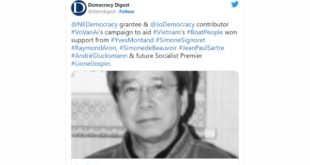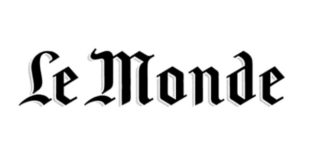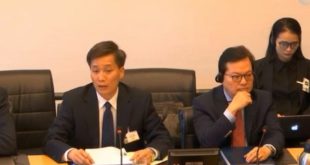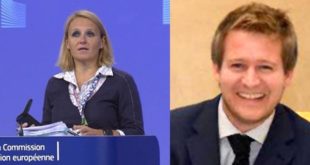
Agence France Presse
HANOI, 17 Aug 2008 (AFP) – Dissident Buddhist monk Thich Quang Do, who Sunday became head of the banned Unified Buddhist Church of Vietnam (UBCV), has spent decades under “pagoda arrest” for his pursuit of justice.
Now aged 79 and based at the Thanh Minh Zen monastery in southern Ho Chi Minh City, the former Saigon, he became the UBCV’s supreme patriarch, succeeding Thich Huyen Quang who died last month in central Vietnam.
The UBCV has been banned since the early 1980s when it refused to join the state-sanctioned Vietnam Buddhist Church, and both Quang and Do spent most of the time since under house arrest in separate monasteries.
“They have tried to destroy us since 1981, but they haven’t succeeded,” Do told AFP last year. Since the end of the Vietnam war in 1975, he said, “there has been no change in religious freedom. We continue to be repressed.”
Born on November 27, 1928 in northern Thai Binh province with the secular name of Dang Phuc Tue, he became a monk at age 14, according to a biography issued by the UBCV’s Paris office.
The formative event of his life came in 1945, the year Ho Chi Minh declared Vietnam’s independence from France, when a teenaged Do witnessed the execution of his religious master by a communist people’s court.
“Then and there I vowed to do all that I could to combat fanaticism and intolerance and devote my life to the pursuit of justice through the Buddhist teachings of non-violence, tolerance and compassion,” Do later wrote.
“I have never regretted this decision. But little did I realise how this simple vow would lead me down a path paved with prison cells, torture, internal exile and detention for so many years to come.”
In the 1950s, when Vietnam was split into a communist North and a US-backed South, Do went to study Buddhist philosophy in India and Sri Lanka for six years before returning as a scholar to South Vietnam.
There he ran afoul in the 1960s of the regime of Ngo Dinh Diem and was jailed and tortured for opposing the Catholic president’s anti-Buddhist crackdowns. He was freed when the Diem regime fell in late 1963.
From 1977 — two years after the fall of Saigon — Do spent 20 months in solitary confinement for “counter-revolutionaries activities,” having protested against violations included the confiscation of UBCV property.
Do and Quang were freed in December 1978 — having both been nominated for the Nobel Peace Prize — but were again arrested in 1982 for refusing to bring their religious group under state control.
Do spent the next decade under house arrest in Thai Binh but then defied authorities and returned to Ho Chi Minh City.
In late 1994 he planned an unauthorised aid mission for Mekong Delta flood victims. He was arrested the following year and sentenced to five years in a re-education camp on charges of “sabotaging national solidarity.”
He was freed in a September 1998 amnesty following pressure from exiled Tibetan spiritual leader the Dalai Lama and other Nobel laureates but remained under house arrest in his monastery.
Do kept challenging the authorities, writing an “Appeal for Democracy” in 2001, calling on northern and southern dissidents to drop their cultural differences and unite in 2005, visiting protesting landless farmers last year, and publicly supporting fellow Buddhists in Myanmar and Tibet.
In 2006 he received Norway’s Rafto human rights award for “his personal courage and perseverance through three decades of peaceful opposition against the communist regime in Vietnam, and as a symbol for the growing democracy movement.”
fz/mtp
 Quê Me Quê Me: Action for democracy in Vietnam & Vietnam Committee on Human Rights
Quê Me Quê Me: Action for democracy in Vietnam & Vietnam Committee on Human Rights



